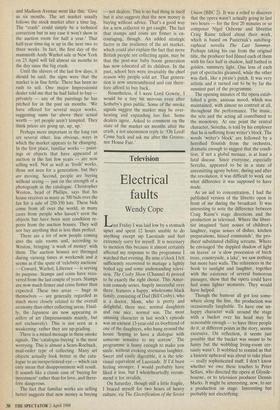Television
Electrical faults
Wendy Cope
Last Friday I was laid low by a stomach upset and spent 12 hours unable to do anything except sip Lucozade and feel extremely sorry for myself. It is necessary to mention this because it almost certainly affected my response to the programme I watched that evening. By nine o'clock I felt sufficiently recovered to manage a lightly boiled egg and some undemanding televi- sion. The Cosby Show (Channel 4) proved to be exactly the right choice. This Amer- ican comedy series, hugely successful over there, features a happy, wholesome black family, consisting of Dad (Bill Cosby), who is a doctor, Mom, who is pretty and delightful, three nice, normal daughters and one nice, normal son. The most amusing character in last week's episode was an earnest 13-year-old ex-boyfriend of one of the daughters, who hung around the house 'hoping to have a dialogue with someone sensitive to my sorrow'. The programme is funny enough to make you smile, without evoking strenuous laughter. Sweet and easily digestible, it is the tele- visual equivalent of Lucozade. If I'd been feeling stronger, I would probably have liked it less, but I wholeheartedly recom- mend it for invalids.
On Saturday, though still a little fragile, I braced myself for two hours of heavy culture, viz The Electrification of the Soviet Union (BBC 2). It was a relief to discover that the opera wasn't actually going to last two hours — for the first 20 minutes or so composer Nigel Osborne and librettist Craig Raine talked about their work, which is based on Pasternak's autobiog- raphical novella The Last Summer. Perhaps taking his cue from the original title, the producer had filmed each of them with his face half in shadow, half bathed in golden, summery light. One lens of each pair of spectacles gleamed, while the other was dark, like a pirate's patch. It was very artistic and it turned out to be by far the sunniest part of the programme.
The opening minutes of the opera estab- lished a grim, anxious mood, which was maintained, with almost no contrast at all, throughout the performance. The music, the sets and the acting all contributed to the monotony. At one point the central character, Serezha, is told by his employer that he is suffering from writer's block. The words `writer's block' are followed by a horrified flourish from the orchestra, dramatic enough to suggest that the condi- tion, if not a global menace, is at least a fatal disease. Since everyone, especially Serezha, appeared to be in a state of unremitting agony before, during and after the revolution, it was difficult to work out what difference it was supposed to have made.
As an aid to concentration, I had the published version of the libretto open in front of me during the broadcast. It was interesting to note the difference between Craig Raine's stage directions and the production as televised. Where the libret- tist imagined `faint noises of children's laughter, vague noises of dishes, kitchen preparations, hissed commands', the pro- ducer substituted chilling screams. Where he envisaged 'the dappled shadow of light on leaves' or 'a slow procession of birch trees, countryside, a lake', we saw nothing but more bare walls. The references in the book to sunlight and laughter, together with the existence of several humorous passages, show that the opera could have had some lighter moments. They would have helped.
Though the humour all got lost some- where along the line, the production was occasionally laughable. To have one un- happy character walk around the stage with a bucket over his head may be reasonable enough — to have three people do it, at different points in the story, seems excessive. On reflection, it seems just possible that the bucket was meant to be funny but the wobbling living-room cer- tainly wasn't. It wobbled to remind us that a historic upheaval was about to take place — really sophisticated stuff. I don't know whether we owe these touches to Peter Sellars, who directed the opera at Glynde- bourne, or to television producer Dennis Marks. It might be interesting, now, to see a production on stage. Interesting but probably not electrifying.


















































 Previous page
Previous page